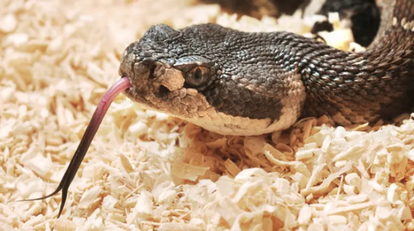Snake venom is a complex cocktail of toxins, amino acids and proteins that evolved primarily to immobilize and kill prey, but it also prepares tissues for digestion. In humans, venom causes severe swelling and instability of blood pressure, neuromuscular weakness and paralysis, hemorrhaging, and the death of skeletal muscle, leading to permanent tissue loss and amputations. The World Health Organization estimates that 138,000 people are killed by venomous snakes annually, and most of them die before they can reach emergency medical care. These deaths get little publicity because they occur most often in impoverished, backwater areas of Southeast Asia, Australia, Africa, India, and Central America. The vast majority of victims who are being killed or maimed by snake bites are village farmers and children working out in the fields without shoes where there is no easy way to treat snakebite in the field.
In the United States, typical standard-of-care antivenoms following bites by rattlesnakes, copperheads, water moccasins and coral snakes are extremely expensive, require refrigeration and must be administered intravenously in a hospital setting. They are also species-specific, meaning selecting proper antivenom requires knowing which type of snake bit you. As a result, survivors of rattlesnake bites get a second painful surprise when presented with hospital bills totaling hundreds of thousands of dollars. Dr. Lewin has been working for a decade to develop an easy-to-use solution to potentially deadly snakebite with a drug called Varespladib. What makes Varespladib promising is that it blocks phospholipase-A2, a highly toxic protein that is present in 95% of all snake venoms and plays a direct role in life-threatening tissue destruction, catastrophic bleeding, paralysis and respiratory failure. Proponents say the small synthetic molecule has the potential to stop or reverse neurological damage, as well as restore normal blood-clotting ability when administered immediately after envenoming. Drug trials are being conducted by Ophirex Inc. — a public benefit corporation that Lewin co-founded. The U.S. Food and Drug Administration granted Varespladib a “fast track” designation in 2022 to expedite development and review of its safety and effectiveness, as well as Ophirex’s proposals for manufacturing and distributing the drug. The Department of Defense has also invested about $24 million into the effort, saying the drug could provide an important capability to teams of special forces deployed in austere conditions where snakebites are a significant threat to life and limb. There is also a psychological benefit to having something in your pocket that is life-saving. Getting any new drug from the laboratory to the market is an expensive, intricate process that can sometimes take many years. Ophirex is completing a Phase II clinical trial in the United States and India to determine the tolerability and potential side effects of multi-dose regimens of the drug in about 100 suspected or confirmed snakebite victims. A federal analysis of the results is expected sometime next year and will ultimately determine whether Ophirex has a blockbuster snakebite drug treatment with military and global market opportunities. Some day soon we hope everybody working or recreating in snake country can carry a few new pills in their first aid kits and backpacks. No matter how many signs that are posted: “CAUTION: Entering Rattlesnake Country. Be alert when walking” there is always the accidental potential to step on a rattlesnake, especially for those working in the timber or oil industries. And even if/when the new pill is available, you'll always want to avoid getting bit by any snake in the first place, so continue to wear snake gaiters and be aware of your surroundings. SOURCE: Marin Independent Journal Comments are closed.
|
RAZER GAITERS

 RSS Feed
RSS Feed
